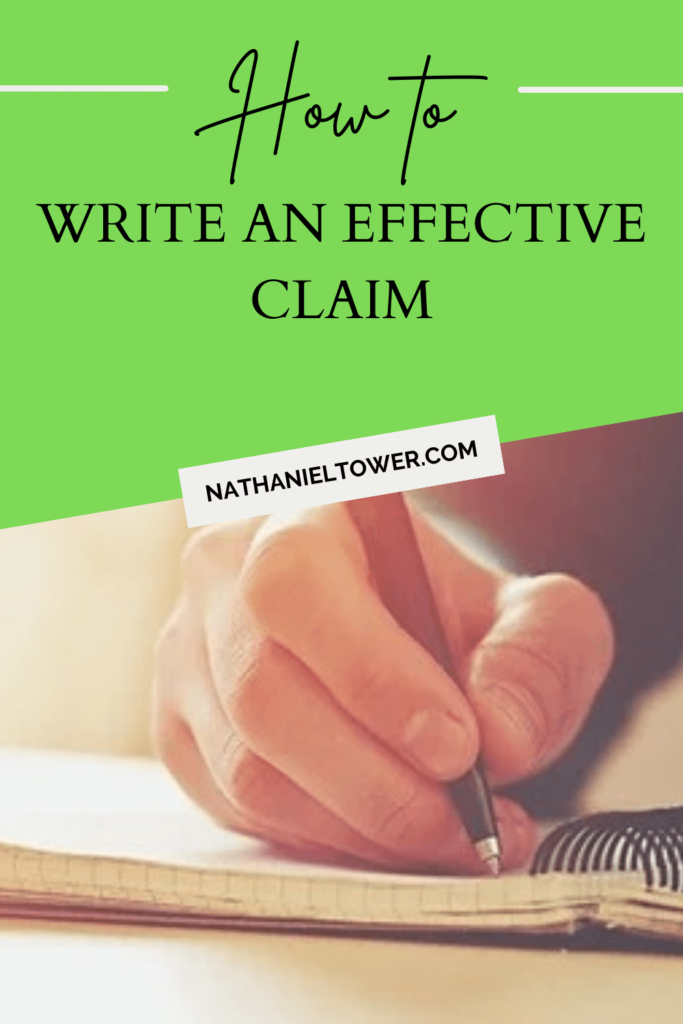What Is a Claim in an Essay? Read This Before Writing
What is a claim in an essay?
In this article, you’ll find the essay claim definition, characteristics, types, and examples. Let’s learn where to use claims and how to write them.
Get ready for up-to-date and practical information only!

What Is a Claim in Writing?
A claim is the core argument defining an essay’s goal and direction. (1) It’s assertive, debatable, and supported by evidence. Also, it is complex, specific, and detailed.
Also known as a thesis, a claim is a little different from statements and opinions. Keep reading to reveal the nuances.
Claims vs. statements vs. opinions
| – Debatable – Supported by evidence – Answering the “So what?” question | – No criticism, investigation, or analysis – Support and argument aren’t necessary – Not going beyond the info from a core text | – More opinion than academic reasoning – No need for evidence – Stating support, not necessarily the reason behind the support |
Where to use claims
To answer the “What is claim in writing?”, it’s critical to understand that this definition isn’t only for high school or college essays. Below are the types of writing with claims:
- Argumentative articles. Consider a controversial issue, proving it with evidence throughout your paper.
- Literary analysis. Build a claim about a book , and use evidence from it to support your claim.
- Research papers. Present a hypothesis and provide evidence to confirm or refute it.
- Speeches. State a claim and persuade the audience that you’re right.
- Persuasive essays and memos. State a thesis and use fact-based evidence to back it up..
What can you use as evidence in essays?
- Facts and other data from relevant and respectful resources (no Wikipedia or other sources like this)
- Primary research
- Secondary research (science magazines’ articles, literature reviews, etc.)
- Personal observation
- Expert quotes (opinions)
- Info from expert interviews
How to Write a Claim in Essays
Two points to consider when making a claim in a college paper:
First, remember that a claim may have counterarguments. You’ll need to respond to them to make your argument stronger. Use transition words like “despite,” “yet,” “although,” and others to show those counterclaims.
Second, good claims are more complex than simple “I’m right” statements. Be ready to explain your claim, answering the “So what?” question.
And now, to details:
Types of claims in an essay (2)
| Your position on: – What happened? – Does it exist? | |
| Your position on: – What is it? – How does its usual meaning change in different contexts? | |
| Your position on: – Is it good or bad? – Who thinks so? – What criteria should I use to evaluate it? | |
| Your position on: – Why did it happen? – What are the effects? – What will be the results on a long-term basis? | |
| Your position on: – What can we learn by this comparison? – How can we understand one thing by looking at another? | |
| Your position on: – What should we do? – How can we solve this problem? – What should be future policy? |
Writing a claim: Details to consider
What makes a good claim? Three characteristics (3):
- It’s assertive. (You have a strong position about a topic.)
- It’s specific. (Your assertion is as precise as possible.)
- It’s provable. (You can prove your position with evidence.)
When writing a claim, avoid generalizations, questions, and cliches. Also, don’t state the obvious.
- Poor claim: Pollution is bad for the environment.
- Good claim: At least 25% of the federal budget should be spent upgrading businesses to clean technologies and researching renewable energy sources to control or cut pollution.
How to start a claim in an essay?
Answer the essay prompt. Use an active voice when writing a claim for readers to understand your point. Here is the basic formula:
When writing, avoid:
- First-person statements
- Emotional appeal
- Cluttering your claim with several ideas; focus on one instead
How long should a claim be in an essay?
1-2 sentences. A claim is your essay’s thesis: Write it in the first paragraph (intro), presenting a topic and your position about it.
Examples of Claims
Below are a few claim examples depending on the type. I asked our expert writers to provide some for you to better understand how to write it.
Feel free to use them for inspiration, or don’t hesitate to “steal” if they appear relevant to your essay topic. Also, remember that you can always ask our writers to assist with a claim for your papers.
| Fact | |
| Definition | |
| Value | |
| Cause | |
| Comparison | |
| Policy |
Final Words
Now that you know what is a claim in an essay, I hope you don’t find it super challenging to write anymore. It’s like writing a thesis statement; make it assertive, specific, and provable.
If you still have questions or doubts, ask Writing-Help writers for support. They’ll help you build an A-worthy claim for an essay.
References:
- https://www.pvcc.edu/files/making_a_claim.pdf
- https://lsa.umich.edu/content/dam/sweetland-assets/sweetland-documents/teachingresources/TeachingArgumentation/Supplement2_%20SixCommonTypesofClaim.pdf
- https://students.tippie.uiowa.edu/sites/students.tippie.uiowa.edu/files/2022-05/effective_claims.pdf
- Essay samples
- Essay writing
- Writing tips
Recent Posts
- Writing the “Why Should Abortion Be Made Legal” Essay: Sample and Tips
- 3 Examples of Enduring Issue Essays to Write Yours Like a Pro
- Writing Essay on Friendship: 3 Samples to Get Inspired
- How to Structure a Leadership Essay (Samples to Consider)
- What Is Nursing Essay, and How to Write It Like a Pro

What Is a Claim in Writing? [Explained + 30 Examples]
Ever wondered what gives a piece of writing its backbone? It’s the claim!
A claim is what sets the stage for your argument, providing a clear and compelling statement that you’ll back up with evidence. This guide will walk you through everything you need to know about claims in writing, from the different types to how to create them step-by-step.
But first, let’s fully answer the main question, What is a claim in writing?
Here Is the Definition of a Claim in Writing:
A claim is a debatable statement that forms the core of your argument. Unlike a fact, which is indisputable, a claim requires evidence and justification. It’s the statement around which the rest of the essay or piece revolves. In essence, a claim is what you’re trying to prove to your reader.

Table of Contents
Types of Claims
There are many different types of claims you need to know:
- Example : “Climate change is caused by human activities.”
- Support : Temperature records, scientific studies.
- Example : “Social media negatively impacts mental health.”
- Support : Psychological studies, expert opinions.
- Example : “The government should implement stricter gun control laws.”
- Support : Crime statistics, case studies of other countries.
- Example : “Regular exercise improves mental health.”
- Support : Health studies, testimonials.
- Example : “Freedom of speech includes the right to criticize the government.”
- Support : Legal precedents, philosophical arguments.
- Example : “Electric cars are more efficient than gasoline cars.”
- Support : Efficiency studies, environmental impact reports.
How to Write Effective Claims
To write effective claims, start with a clear statement, support that statement, and apply the best practices below.
Clarity and Precision
An effective claim is clear and precise. It should be specific enough to be arguable and focused enough to be manageable within the scope of your essay. Ambiguous or overly broad claims can confuse readers and weaken your argument.
Example of a weak claim : “Technology is bad.”
Example of a strong claim : “The overuse of technology in classrooms can hinder students’ social skills and critical thinking abilities.”
Debatable and Supportable
A good claim is debatable, meaning that it presents a point that some people might disagree with.
If everyone agrees with your claim, there’s no argument to be made. Additionally, your claim must be supportable with evidence. You should be able to back up your claim with facts, statistics, expert opinions, and real-life examples.
Example : “Lowering the voting age to 16 would lead to more informed and engaged citizens.”
Strategies for Writing Effective Claims
- Example : Instead of “Pollution is bad,” say “Air pollution in urban areas increases respiratory health issues.”
- Example : “Implementing renewable energy sources will reduce carbon emissions.”
- Example : For a local audience, “Banning plastic bags in our city will reduce local waterway pollution.”
- Example : “School uniforms improve student discipline and focus.”
- Example : “Universal healthcare will decrease overall healthcare costs.”
Supporting Your Claims
One of the most important parts of how to write a claim is to come up with good support.
You’ll want to explore the evidence, counterclaims, and rebuttals.
Types of Evidence
Supporting a claim involves providing evidence and analyzing how that evidence backs up your claim. Different types of evidence include:
- Example : “According to the CDC, smoking is responsible for over 480,000 deaths per year in the U.S.”
- Example : “Dr. Smith, a renowned cardiologist, states that regular exercise can reduce the risk of heart disease.”
- Example : “My friend quit smoking and noticed significant improvements in his health within months.”
- Example : “Just as a balanced diet is essential for physical health, a balanced curriculum is vital for educational success.”
Counterclaims and Rebuttals
Addressing counterclaims is crucial in strengthening your argument. Acknowledging opposing viewpoints and then refuting them shows that you have considered different perspectives and have a well-rounded understanding of the issue.
Example : “While some argue that 16-year-olds lack the maturity to vote responsibly, studies indicate that younger voters are just as capable of making informed decisions as older voters, especially when given the appropriate civic education.”
Developing the Argument
Each body paragraph should focus on a single supporting point for your claim.
Start with a topic sentence that introduces the point, followed by evidence and analysis that supports it. Include a counterclaim and rebuttal to demonstrate critical thinking and thorough understanding.
- Topic Sentence : “Mental health education helps reduce stigma and promotes awareness.”
- Evidence : Studies showing decreased stigma in schools with mental health programs.
- Analysis : Explain how awareness leads to early intervention and better outcomes.
- Counterclaim : “Some argue that discussing mental health in schools could lead to increased anxiety among students.”
- Rebuttal : “However, research indicates that education reduces anxiety by providing students with coping strategies and support.”
Structuring Your Argument
People often overlook the power of structure — yet, a good structure can make or break your claim.
As a quick overview, the structure is:
- Introduction
- Development
Introduction of a Claim
In the introduction, present your claim clearly and concisely. It should be part of your thesis statement, which outlines the main argument of your essay.
Example : “To address the growing mental health crisis among adolescents, schools should implement mandatory mental health education, which has been shown to improve students’ well-being and academic performance.”
Summarize your main points and restate your claim in a way that underscores its importance.
Highlight the broader implications of your argument and suggest areas for further research or action.
Example : “In conclusion, mandatory mental health education in schools is a crucial step towards addressing the mental health crisis among adolescents. By reducing stigma and providing essential support, these programs can lead to a healthier, more informed student population.”
Common Mistakes to Avoid
Over the years, I’ve noticed patterns of mistakes when it comes to writing claims.
Avoid these common claim writing mistakes to level up your persuasive prowess.
Overly Broad Claims
Claims that are too broad can be difficult to support with evidence. Narrow your focus to a specific aspect of the issue.
Example of a broad claim : “Technology affects education.”
Revised claim : “The integration of artificial intelligence in education can enhance personalized learning experiences.”
Unsupported Claims
Claims without evidence are simply opinions. Ensure that every claim is backed up with solid evidence.
Example of an unsupported claim : “Social media is bad for teenagers.”
Supported claim : “Social media usage among teenagers is linked to higher rates of anxiety and depression, according to multiple studies.”
Vague Language
Avoid vague language that can confuse readers. Be specific and clear in your assertions.
Example of vague language : “People should be healthier.”
Revised language : “Regular exercise and a balanced diet are essential for maintaining physical health and preventing chronic diseases.”
Lack of Counterarguments
Ignoring counterarguments can weaken your position.
Addressing and refuting counterclaims shows that you have considered multiple perspectives.
Example : “While some argue that electric cars are too expensive, government incentives and falling battery costs are making them more affordable.”
Check out this popular and helpful video about claims in writing:
Examples of Claims in Writing
In this section, I’ve put together 100 examples of claims in writing.
Read through them and see if you can spot the different tips and techniques that we’ve covered throughout his guide.
Fact Claims
- “The global population has surpassed 8 billion people.”
- “Renewable energy sources are now cheaper than fossil fuels.”
- “Honey never spoils and can last indefinitely.”
- “The Amazon rainforest produces 20% of the world’s oxygen.”
- “Venus is the hottest planet in our solar system.”
- “Human brains continue to develop until the age of 25.”
- “Eating too much sugar can lead to type 2 diabetes.”
- “The Great Wall of China is visible from space.”
- “Smoking is the leading cause of lung cancer.”
- “More people die from car accidents than plane crashes.”
Value Claims
- “A vegetarian diet is healthier than a meat-based diet.”
- “Classical literature is more enriching than modern fiction.”
- “Handwritten letters are more personal than emails.”
- “Watching too much television is bad for children’s development.”
- “Recycling is the best way to combat waste.”
- “Public libraries are essential to community development.”
- “High school should start later in the morning.”
- “Art is a vital part of human culture.”
- “Learning a second language is crucial in today’s global society.”
- “Exercise is the best way to maintain mental health.”
Policy Claims
- “Governments should invest more in renewable energy sources.”
- “The legal drinking age should be raised to 21.”
- “Schools should require students to wear uniforms.”
- “The use of plastic bags should be banned worldwide.”
- “Healthcare should be free for all citizens.”
- “Public transportation should be expanded in urban areas.”
- “Corporations should be held accountable for their carbon emissions.”
- “Voting should be mandatory for all eligible citizens.”
- “There should be stricter regulations on data privacy.”
- “The minimum wage should be increased to reflect the cost of living.”
Definition Claims
- “Success is defined by personal happiness, not wealth.”
- “Freedom of speech includes the right to offend.”
- “Art encompasses all forms of creative expression.”
- “Patriotism means supporting your country but also criticizing it.”
- “Leadership is about inspiring others, not commanding them.”
- “Intelligence includes emotional awareness and interpersonal skills.”
- “Justice means equality for all, regardless of background.”
- “Democracy requires active participation from its citizens.”
- “Innovation is the process of creating new and useful ideas.”
- “Beauty is subjective and varies across cultures.”
Cause and Effect Claims
- “Deforestation leads to loss of biodiversity.”
- “Excessive screen time can cause eye strain and headaches.”
- “A lack of exercise can lead to obesity.”
- “Poor nutrition can affect cognitive development in children.”
- “Climate change causes more frequent and severe weather events.”
- “Social isolation can lead to mental health issues.”
- “Pollution contributes to respiratory problems.”
- “Lack of sleep negatively impacts academic performance.”
- “Economic inequality leads to social unrest.”
- “Regular physical activity reduces the risk of chronic diseases.”
Additional Fact Claims
- “Antibiotic resistance is a growing global health threat.”
- “Sharks have existed for over 400 million years.”
- “The Pacific Ocean is the largest and deepest ocean on Earth.”
- “The human genome contains approximately 20,000-25,000 genes.”
- “Electric cars have lower lifetime carbon emissions than gasoline cars.”
- “Mount Everest is the tallest mountain above sea level.”
- “The Earth’s atmosphere is composed of 78% nitrogen.”
- “The average human body temperature is approximately 98.6°F (37°C).”
- “Water is a universal solvent.”
- “Venus spins in the opposite direction to most other planets.”
Additional Value Claims
- “Music education should be a part of every school curriculum.”
- “Reading daily improves cognitive function.”
- “Volunteering is a rewarding and valuable experience.”
- “Traveling broadens one’s perspective and understanding of the world.”
- “Meditation is beneficial for mental and emotional well-being.”
- “Healthy relationships are key to a fulfilling life.”
- “Supporting local businesses strengthens communities.”
- “Sustainable living is crucial for future generations.”
- “Outdoor activities are essential for a healthy lifestyle.”
- “Creativity is an important skill in any profession.”
Additional Policy Claims
- “The government should subsidize renewable energy projects.”
- “Education reform is necessary to improve public schools.”
- “There should be stricter gun control laws.”
- “Mental health services should be more accessible.”
- “The use of fossil fuels should be heavily taxed.”
- “Public parks should be preserved and maintained.”
- “There should be incentives for companies to reduce their carbon footprint.”
- “Urban planning should prioritize green spaces.”
- “Sex education should be mandatory in schools.”
- “The criminal justice system needs significant reform.”
Additional Definition Claims
- “Work-life balance means prioritizing personal time as much as work.”
- “Friendship is based on mutual respect and understanding.”
- “Success in life is achieving one’s personal goals and happiness.”
- “Innovation is the application of better solutions to meet new requirements.”
- “Equality means providing the same opportunities for all individuals.”
- “A hero is someone who acts selflessly for the benefit of others.”
- “Integrity is adhering to moral and ethical principles.”
- “Creativity is the ability to generate original ideas.”
- “Education is the process of facilitating learning and acquisition of knowledge.”
- “Respect means acknowledging the worth and dignity of others.”
Additional Cause and Effect Claims
- “Excessive alcohol consumption can lead to liver disease.”
- “Lack of parental involvement can affect a child’s academic performance.”
- “Air pollution contributes to global warming.”
- “Regular exercise improves mental health.”
- “Stress can lead to high blood pressure.”
- “Deforestation can cause soil erosion.”
- “Smoking during pregnancy can harm fetal development.”
- “High sugar intake can lead to cavities.”
- “Prolonged exposure to loud noise can cause hearing loss.”
- “Inadequate sleep can impair immune function.”
Final Thoughts: What Is a Claim in Writing?
Writing a strong claim is like laying the foundation for a great argument. It’s the starting point that guides your entire piece.
Remember, a good claim is clear, specific, and backed by solid evidence. Don’t be afraid to take a stance and make your argument compelling. Happy writing, and may your claims always be strong and persuasive!
Read This Next
- Types of Evidence in Writing [Ultimate Guide + Examples]
- 50 Best Counterclaim Transition Words (+ Examples)
- RACE Writing: A Comprehensive Guide + Examples
- Oreo Opinion Writing [Tips, Guide, & Examples]
- Writing Rubrics [Examples, Best Practices, & Free Templates]
How to Write an Effective Claim (with Examples)
Formulating a claim for your essay can be difficult even if you are already a masterful debater — especially if you are not quite sure what a claim is, and how it may differ from a counterclaim or thesis statement. This guide will make it easy to decide on your claim!
Essay Claim Basics
In essay writing, a claim can most succinctly be defined as "a debatable statement" — which the writer then defends with supporting evidence and rhetoric. It is easy to confuse a claim and a thesis statement, because the thesis is indeed a type of claim as well. Essays can contain further claims that orbit the topic of the thesis statement, however.
Claims straddle the line between opinion and fact. If you're hoping to make a strong claim that seamlessly fits into a powerful essay, you will need to make sure that your claim ticks the right boxes:
- Your claim can debated — solid arguments can be made both in favor and against. Therefore, statements such as "I live in Queens" or "Joe Biden is the President" are not claims. In an argumentative essay, "the death penalty should be abolished" is an example of a claim. Even scientific papers make claims, such as "Keyboards contain more germs than toilet seats", which can be tested. These are called hypotheses.
- You will state your claim as a matter of fact. "Many people oppose the death penalty, and with good reason" is not a good claim, but "the death penalty is no longer an appropriate punishment in modern America" can be.
- Your claim is sufficiently specific to allow you to explore all aspects that you intend to tackle. "The Victorian era was Britain's darkest era" give you more bite than you can comfortably chew. "Fast food should be taxed to reduce obesity rates" is more specific.
Types of Claim (With Examples!)
Claims are debatable statements, but there are numerous different types. If you have specifically been asked to present a claim in an essay, you may be able to choose what kind of claim you would like to work with.
1. Claim of Fact or Definition
In research essays, a claim of fact or definition is one that defines a fact, as you see it, and proceeds to lay out the evidence in favor of the claim. Here are some examples to show you how it works:
- Plant species are becoming extinct at a faster rate than animal species, yet the plight of plants has been overlooked.
- Amazon's Alexa has revolutionized many people's daily lives — but this appliance also makes us vulnerable to new forms of hacking.
- Commercial air travel transformed the way in which we do business.
2. Claim of Cause & Effect
In a claim of cause and effect, you argue that one thing causes another, such as:
- Internet gaming has a widespread negative effect on students' grades.
- Lax enforcement of preventative measures against Covid has enabled the pandemic to continue for much longer than it need have.
- Playing jigsaw puzzles leads to novel cognitive connections that help senior citizens stay sharp.
3. Claim of Value
Claims of value are more heavily opinion-based than other types of claims. If you are making a claim of value, you will usually want to compare two things. For example:
- George W Bush was a better President than George W H Bush.
- Emotional health is just as important as physical health.
- Stephen King is the best horror writer of al time.
4. Claim of Solution or Policy
Claims of solution or policy state a position on a proposed course of action. In high school and college essays, they typically focus on something that should be done, or something that should no longer be done. Examples might include:
- Depressed patients should always be offered talk therapy before they receive a prescription for antidepressants.
- The United States should not accept refugees from Afghanistan.
- First-time offenders should be given lighter sentences.
Claim vs. Counterclaim vs. Thesis Statement
If you've been told to make an essay claim, you may be confused about the differences between a claim, counterclaim, and thesis statement. That's understandable, because some people believe that there's no difference between a claim and a thesis statement.
There are important distinctions between these three concepts, however, and if you want to write a killer essay, it's important to be aware of them:
- A thesis statement is the very foundation of your essay — everything else rests on it. The thesis statement should contain no more than one or two sentences, and summarize the heart of your argument. "Regular exercise has consistently been shown to increase productivity in the workplace. Therefore, employers should offer office workers, who would otherwise be largely sedentary, opportunities to work out."
- A claim is a statement you can defend with arguments and evidence. A thesis statement is a type of claim, but you'll want to include other claims that fit neatly into the subject matter as well. For instance, "Employers should establish gyms for employees."
- A counterclaim is a statement that contradicts, refutes, or opposes a claim. Why would you want to argue against yourself? You can do so to show that arguments that oppose the claim are weak. For instance, "Many employers would balk at the idea of facilitating costly exercise classes or providing a gym space — employees can work out in their own time, after all. Why should the boss pay for workers to engage in recreational activities at work? Recent studies have shown, however, that workplaces that have incorporated aerobics classes enjoy 120% increase in productivity, showing that this step serves the bottom line."
Together, a thesis statement, claims, and some well-placed counterclaims make up the threads of your story, leading to a coherent essay that is interesting to read.

How to Write an Effective Claim
Now that you've seen some examples, you are well on your way to writing an effective claim for your essay. Need some extra tips? We've got you covered.
First things first — how do you start a claim in an essay? Your claim sentence or sentences should be written in the active voice, starting with the subject, so that your readers can immediately understand what you are talking about.
They'll be formulated as an "[Subject] should be [proposed action], because [argument]. You can stay with this general structure while making different word choices, however, such as:
- It is about time that
- We have an obligation to
- Is the only logical choice
- It is imperative that
Once you have formulated a claim, you will want to see if you can hook your readers with an interesting or provocative statement that can really get them thinking. You will want to break your argument down into sections. This will lead you to sub-claims. If your claim is your main argument, your sub-claims are smaller arguments that work to support it. They will typically appear naturally once you contemplate the subject deeply — just brainstorm, and as you research, keep considering why your claim is true. The reasons you come up with will sprout sub-claims.
Still not sure what to write? Take a look at these examples of strong claim statements:
- A lack of work experience has proven to be the main barrier to finding satisfying employment, so businesses should be incentivized to hire recent graduates.
- The rise in uncertified "emotional support animals" directly causes suffering for people suffering from severe pet dander allergies. Such pets must be outlawed in public places to alleviate the very real harm allergy patients now experience on a daily basis.
- Emerging private space exploration ventures may be exciting, but they greatly increase CO2 emissions. At a time when the planet is in crisis, private space exploration should be banned.
Additional Tips in Writing a Claim the Right Way
You now know what you need to include in a claim paragraph to leave a strong impression. Understanding what not to do is equally important, however.
- Take a stand — if you're writing an argumentative essay, it is perfectly OK to take a controversial opinion, and no matter what you write, it is bound to have the potential to offend someone . Don't sit on the fence. Even when you're defending a position you disagree with, embrace it wholeheartedly.
- Narrow your claim down. The more specific you can get, the more compelling your argument can be, and the more depth you can add to each aspect of your argument.
- Have fun! You want your essay to be interesting to read, and any genuine passion you have will be apparent.
- Choose the right subject — one about which you can find a lot of data and facts.
What should you avoid in writing a claim, you wonder? Don't:
- Use any first-person statements. The claim is about your ideas, not about you.
- Base your claim on emotional appeal. You can work some pathos in, but don't make feelings your center.
- Clutter your claim with too many separate ideas, which will make the rest of your essay harder to read, less powerful, and unwieldy for you to develop.
How do you use a claim?
When you're writing your essay, you can think of the thesis statement as the spine. The claims you make are, then, your "ribs", so to speak. If you prefer a different analogy, the thesis is your trunk, and the claims branches. You use them to build a strong final product that shows you have considered all aspects of your argument, and can back them up with evidence and logic.
What is a good way to start a claim?
You can start with a shocking fact, objective data from a reliable source, or even an anecdote — or, if you prefer, you can simply offer your argument without bells and whistles.
Can a claim be in a paragraph or is it a single sentence only?
Claims are almost always limited to a single sentence. It can be a long compound sentence, though! The claim does not have to remain all alone in the paragraph. You can immediately surround it with rhetorical punches or further facts.
What are some examples of argumentative claims?
So, you want to learn to argue like a pro? Watching speeches politicians make is a great way to look out for claims, and court transcripts and academic debates are two other places you can look for great argumentative claims.
Is there a claim generator you can use?
Yes! Some claim generators are free to use, while others require a subscription. These tools can be interesting to play with, and can serve as inspiration. However, it's always best to tweak your final claim to fit your needs.
Related posts:
- Bone of Contention - Meaning, Usage and Origin
- I Beg to Differ - Meaning, Origin and Usage
- Chewing the Fat - Meaning, Usage and Origin
- All that Glitters is Not Gold - Meaning, Origin and Usage
- Ginning Up - Meaning, Usage and Origin
- Chime In - Meaning, Origin and Usage
Leave a Reply Cancel reply
Your email address will not be published. Required fields are marked *
What Is a Claim in Writing? Definition, Types, & Examples
- February 20, 2024
- Freelancing Tips
Table of Contents Hide
What is a claim in writing, claim of fact, claim of value, claim of policy, types of writing with claims, examples of claims in writing, what is the difference between claims, opinions and facts, why do we use claims in writing, what is a counterclaim in writing, faqs on claim in writing, we also recommend.
When it comes to writing, making a claim is a crucial aspect of building a strong argument. But what exactly is a claim? Essentially, a claim is a statement that asserts a particular point or position on a specific topic. Claims serve as the foundation for persuasive writing and are essential for effectively making your case to your audience.
Understanding the different types of claims and how to effectively use them can greatly enhance the persuasiveness of your writing. Whether you are writing an essay, a research paper, or a persuasive speech, knowing how to craft strong claims is key to convincing your audience of your point of view.
In this article, we will explore the definition of a claim in writing, the various types of claims you can make, and provide examples to help you better understand how claims function in different contexts. By mastering the art of making compelling claims, you can elevate the quality of your writing and make a more convincing argument every time.
A claim in writing is the core argument defining an essay’s goal and direction. It’s assertive, debatable, and supported by evidence. Also, it is complex, specific, and detailed.
Think of a claim as a specific, debatable statement you, the writer, intend to prove or support. It’s the central argument in your essay, the core message of your blog post , and the foundation of your persuasive pitch. Unlike opinions, which are subjective beliefs without the burden of proof, claims demand justification. They’re the battle cry, the call to action, inviting your reader to join you on a quest for understanding and agreement.
READ ALSO: What Is Speech Writing? Best Tips And Jobs In 2024
What Are The Types Of Claims In Writing?
There are three types of claims: claims of fact, claims of value, and claims of policy . Each type of claim focuses on a different aspect of a topic. To best participate in an argument, it is beneficial to understand the type of claim that is being argued.
A claim of fact declares the existence, current presence, or future occurrence of something measurable. The core issue within a factual claim revolves around the reasonableness of the stated fact. To put it differently, a claim of fact engages in a discussion about the accuracy or inaccuracy, validity or invalidity, truth or falsehood of the statement. When making such assertions, our reasoning typically progresses from the known to the unknown. Claims of fact also center on examining cause-and-effect relationships.
SEE ALSO: What Is Speech Writing? Best Tips And Jobs In 2024
A claim of value makes qualitative assessments of people, things, and events in one’s surroundings on a good-to-bad continuum. You have made a valuable claim if you formulate an opinion that says something is good, terrible, or superior to another. Claims of worth include things like “Indian food is the best food of all,” “The Wizard of Oz is the greatest movie of all time,” and “Snowboarding is the greatest way to spend a vacation.”
A claim of policy makes the assertion that someone should or shouldn’t do a certain action. It suggests that a certain course of action ought to be followed, however, it’s not a given that it will. The conditional verb “should,” which indicates that a certain action ought to be taken but not that it must or will be taken, is crucial when making a claim about policy. For example, “Students should read the assigned text material before the instructor lectures on it,” or “The United States should send a manned expedition to Mars.”
Here’s a list of the types of writing with claims:
- Argumentative articles. Consider a controversial issue, proving it with evidence throughout your paper.
- Literary analysis. Build a claim about a book, and use evidence from it to support your claim.
- Research papers. Present a hypothesis and provide evidence to confirm or refute it.
- Speeches. State a claim and persuade the audience that you’re right.
- Persuasive essays and memos. State a thesis and use fact-based evidence to back it up..
What can you use as evidence in essays?
- Facts and other data from relevant and respectful resources (no Wikipedia or other sources like this)
- Primary research
- Secondary research (science magazines’ articles, literature reviews, etc.)
- Personal observation
- Expert quotes (opinions)
- Info from expert interviews
SEE ALSO: Tips On How To Hire Legal Writers In 2024
Here’s a rundown of examples of claims based on types:
| Fact | The moon landing occurred in 1969 is a fact-based claim that can be supported by historical records |
| Definition | |
| Value | |
| Cause | |
| Comparison | |
| Policy |
Here’s how claims differentiate themselves from their close cousins:
- Opinions: These are personal beliefs, unsupported by evidence. Saying “Pizza is the best food ever” is an opinion, not a claim.
- Facts: These are verifiable truths, independent of interpretation. “The Earth revolves around the Sun” is a fact, not a claim.
- Claims: These are debatable propositions that require evidence to be convincing. “Eating spicy food boosts metabolism” is a claim, as it needs proof to be accepted.
All forms of writing rely on claims to maintain the interest of the reader, give characters more nuance and depth, and convey the author’s own viewpoint on the issues covered.
The objective of a claim in writing is to persuade the reader of anything. Claims drive the reader towards a specific solution, even when they may not agree with the author’s statement at first or may need more information to come to their own opinion. If a reader already concurs with an author’s assertion, the material offered just strengthens and validates the reader’s position.
Have you signed up on WritersGig? Check out How to Register as a Buyer or Writer on WritersGig
When someone presents an alternative argument to your claim, that is a counterclaim. Another word for a counterclaim is a rebuttal. When someone presents a counterclaim, they are making a claim of their own. It will be up to them to state their counterclaim, and then seek to back it up with evidence (just as you did when making the initial claim).
A claim is a statement that asserts a particular stance or viewpoint, while an opinion is a subjective expression of personal beliefs or preferences.
Make your claims more persuasive by providing clear evidence, avoiding overgeneralization, and addressing potential counterarguments.
Writers should be cautious when making claims without sufficient evidence or in areas where the topic is highly subjective and lacks objectivity.
It depends on the nature of the evidence and the claims. In some cases, a well-supported piece of evidence may contribute to multiple related claims.
Claims in writing showcase the diverse ways in which writers express their perspectives and influence their audience. Whether rooted in facts, values, or policies, claims form the bedrock of effective communication. Crafting and evaluating claims require a thoughtful approach, ensuring that writers engage their readers with clarity, evidence, and nuance.
- 15 Different Types of Tones in Writing: Must-Know Guide for All Writers
- 25 Inspiring Freelance Writing Quotes
- Types Of Freelance Writing | Descriptions And Jobs
- What Is A Contraction In Writing? Definition, How To Use, and Examples
Related Posts
Self introduction for job interview with samples & tips to ace easily.
- October 17, 2024
Why Do You Want To Join Our Company? How to Answer & 17 Best Sample Answers
How to write a one day leave application letter | with template and example.

What Is a Claim in an Essay? Unpacking the Core Element with Writing Tips

Picture yourself as a captain steering your ship, a.k.a. your essay, across a wild ocean of ideas. Your secret weapon? The claim. It’s not just some fancy statement – it’s the backbone of your essay, the big point you’re itching to make and stand by.
Getting the hang of crafting a killer claim is like hitting the jackpot for any essay writer. It sets the mood, points the way, and basically makes or breaks your essay. So, let’s dive deep into what makes a claim tick.
What’s a Claim, Anyway?
Think of a claim as your essay’s thesis or main argument. It’s way more than an opinion. It’s a bold, assertive statement that lays down the foundation of your argument. Depending on your essay’s vibe, claims can come in different flavors:
- Factual claims ─ The straight-up truths, like “The Earth does its dance around the Sun.”
- Definitional claims ─ The “what’s what” of things, like “Genetically modified munchies can totally be called organic.”
- Cause and effect claims ─ The “this led to that” stuff, like “Scrolling through Insta all day shoots up anxiety in teens.”
- Value claims ─ Your judgment call, like “Free speech is the lifeblood of democracy, no question.”
- Policy claims ─ The “let’s shake things up” kind, like “Making buses free could clear up city smog.”
Figuring out your type of claim is like choosing the right gear before setting off on an essay adventure.
Building a Rock-Solid Claim

A solid claim is like a good cup of coffee – clear, strong, specific, and just what you need:
- Clear as day ─ It’s got to be easy to get, no beating around the bush.
- Open for debate ─ A tasty claim gets people talking, not just nodding along.
- Specific ─ It zeros in on your essay’s heart, with no wandering off.
- Relevant ─ It’s got to jive with your essay’s main jam.
Cooking Up a Strong Claim
Crafting a top-notch claim? It’s like making a masterpiece. Start broad, then get down to the nitty-gritty:
- Brainstorm central ─ Kick off by throwing ideas around. Ask questions, scribble thoughts, and play with different angles.
- Idea filter ─ Sift through your thoughts, and pick the ones that have that zing of debate.
- Wordplay ─ Your choice of words and tone is key. Be bold, but keep it in line with your essay’s style .
- Learning by example ─ Check out strong and weak claims to see what makes or breaks them.
Rooting Your Claim with Evidence
Your claim needs roots, like a tree. That’s your evidence – the stuff that makes your claim stand up tall:
- Back it up ─ Throw in facts, stats, expert say-so, and real-life tales to beef up your claim.
- Keep It balanced ─ Your evidence should be like a good sidekick – supportive but not stealing the spotlight.
- Counterpunch ─ Tackle the naysayers head-on. It shows you’ve done your homework and you’re not afraid of a little debate.
Claims in Different Essay Worlds

Your claim shifts gears depending on your essay type:
- Analytical essays ─ Here, you’re dissecting stuff like books or historical events to dig out hidden treasures.
- Argumentative essays ─ You’re taking a stand on a hot-button issue, backed by evidence that packs a punch.
- Expository essays ─ You’re the explainer, shining a light on concepts, often with a “here’s the 411” vibe.
Watch Out for These Slip-Ups
Even seasoned essay sailors can hit rough waters:
- Overgeneralizing ─ Steers clear of claims that are too broad. Specific is terrific.
- Evidence MIA ─ Don’t leave your claims hanging without backup. That’s just asking for trouble.
- Going in circles ─ Don’t use your claim to prove your claim. That’s like saying, “It’s true because I say so.”
Fine-tuning Your Claim Crafting a Claim Can Be a Trial-and-error Deal
- Draft city ─ Play around with different versions. Mix and match perspectives and wording.
- Revise for impact ─ Get feedback, then tweak and polish your claim until it shines.
- Open ears ─ Good feedback can turn a decent claim into a showstopper. Embrace it.

The Bottom Line
A well-crafted claim is like the heart of your essay, pumping life and direction into your arguments. Getting good at building strong claims is a game-changer for essay writing. Practice, pay attention to the details, and you’ll be churning out claims that grip your readers and don’t let go. And hey, if you hit a wall, remember there’s help out there – like custom essay writing services – ready to give you a leg up. Keep at it, and you’ll be the master of claims in no time!
Related Posts:
- 4 Tips for Choosing the Best Essay Writing Service
- Essay Writing 2024 ─ Grammar Tips and 5 Common…
- Top Mistakes Students Make When Writing an Essay or…
- 7 Ways and Places to Get Inspired for Essay Writing
- How to Prepare Before Writing a Masterpiece of an Essay
- Reunion shows Confessions that Shook Us to the Core
RELATED ARTICLES MORE FROM AUTHOR

Revolutionizing the Classroom ─ How STEM Education Shapes Future Innovators

5 Advices For Online Students

Mathematics in Art and Music ─ The Harmony of Numbers and Aesthetics

Bard SummerScape ─ A Renaissance of Forgotten Operas

The Impact of Office Desk Placement on Your Workflow

Amy’s Kitchen Takes Home Freezie Award

From Chaos to Order ─ Organizing Your Business the Smart Way

How to Dress Your House to Sell: 10 Tips to Secure...

Want to create or adapt books like this? Learn more about how Pressbooks supports open publishing practices.
What is a claim?

A claim is a statement that presents an idea or series of ideas as arguments. Arguments therefore consist of claims, or another way to put it is, to say that claims are the building blocks of a good argument.
In research writing, claims will be the backbone that form a thesis or a hypothesis (here the term ‘hypothesis’ refers to the argument that is evidenced within the scope of the work).
According to Heady (2013) “Claims are the points you want to prove, interpretations you want to offer, and assertions you want to make” (p. 74). Importantly, in academia claims are statements that can be supported by evidence.
‘Traditional classroom teaching is boring’
For example, claiming that traditional classroom teaching is boring is not a good claim because it lacks definition (what does ‘traditional classroom teaching’ actually mean? and how do we measure ‘boring’)? It may also be a ‘sweeping statement’ (meaning it’s far too general in scope). However, claiming that “traditional teaching methods, like didactic instruction, do not provide sufficient interaction with students and lead to poor learning outcomes” is a good argumentative claim, because it can be investigated and measured.
Characteristics of a good claim
In order to make effective claims it is important to understand the difference between statements and sentences. While a statement is also a sentence (in that it is a grammatical unit with subject, verb, object clause), not all sentences are statements (in other words, not all sentences consist of a stance or a position).
The following provides examples of the difference between sentences and statements. The statements present a stance or position about the topic under discussion. This is important to understand as all claims must consist of a stance towards the topic.
| sentences | statements |
|---|---|
| Bulldogs are a common breed of dog. They originated in the British isles. | Bulldogs are a dangerous breed and should be regulated. |
| Fat is one of three macronutrients. The others being carbohydrate and protein. | Fat has been misrepresented as a leading cause of heart disease. New research challenges this finding. |
Function of claims
The function of claims in academic writing is to provoke, analyse, or interpret rather than merely describe or present facts. They can do this by affirming, acknowledging, confirming, or refuting the proposition being made. In this way, claims do the job of building an overall argument or thesis in a piece of work (i.e. each claim progresses the key argument). It is for this reason that claims will appear in topic sentences, thesis statements, introductory and concluding sentences/paragraphs.
Check your understanding
Research and Writing Skills for Academic and Graduate Researchers Copyright © 2022 by RMIT University is licensed under a Creative Commons Attribution-NonCommercial 4.0 International License , except where otherwise noted.
Share This Book

Nathaniel Tower
Juggling writing and life
Understanding Claims in Writing and How to Craft Effective Ones
Last Updated on July 7, 2023 by Nathaniel Tower
In the realm of academic and persuasive writing, a claim holds significant importance. A claim serves as the central assertion or argument made by a writer to support their position or viewpoint. It is the backbone of an essay or any piece of writing, providing a clear focus and direction for the reader. Crafting a strong claim requires careful thought, analysis, and supporting evidence. In this article, we will delve into the concept of claims in writing and explore effective strategies for constructing compelling and persuasive claims.
What is a Claim?
A claim is a declarative statement that expresses the writer’s position or viewpoint on a particular subject. It is often referred to as a thesis statement or central argument. A well-crafted claim should be concise, specific, and debatable. It presents an opinion or interpretation that can be supported or challenged through logical reasoning and evidence.
Claims can take various forms, including factual claims that present verifiable information, value claims that express opinions about what is good or bad, and policy claims that propose specific courses of action. Regardless of the type, a claim should be formulated in a way that engages the reader and compels them to consider the writer’s perspective.
How to Write an Effective Claim
- Revise and Refine : Once you have drafted your claim, review and revise it to ensure clarity and effectiveness. Check for any logical fallacies, inconsistencies, or weak points in your argument. Seek feedback from peers or instructors to gain different perspectives and improve your claim.
What is a counterclaim in writing?
In writing, a counterclaim refers to a rebuttal or opposing argument presented by the writer to challenge or refute the main claim or thesis statement. It serves as a counterargument that acknowledges the opposing viewpoint and attempts to undermine its credibility or validity. A counterclaim adds depth and complexity to an argument by considering different perspectives and engaging in a more comprehensive analysis of the topic.
When constructing a counterclaim, it is essential to present a strong and logical argument that challenges the original claim. This entails conducting thorough research, gathering evidence, and providing convincing reasoning to support the counterargument. By doing so, the writer demonstrates their ability to critically evaluate multiple viewpoints and engage in a balanced discussion.
A well-crafted counterclaim should address the opposing side’s key points, highlight any weaknesses or fallacies in their argument, and provide a compelling alternative perspective. It is crucial to maintain a respectful tone and avoid personal attacks or derogatory language while presenting the counterclaim. Instead, focus on presenting a coherent and evidence-based argument that can effectively challenge the original claim.
In addition to presenting the counterclaim, it is essential to refute the opposing viewpoint by offering counter-evidence or providing a different interpretation of the existing evidence. This helps strengthen the writer’s position and credibility by demonstrating a comprehensive understanding of the topic and a willingness to engage with alternative perspectives.
By including a counterclaim in their writing, the author not only acknowledges the complexity of the issue but also shows a commitment to intellectual rigor and fairness. It encourages readers to consider multiple viewpoints, critically evaluate arguments, and arrive at a well-informed conclusion. In academic writing, including counterclaims demonstrates the writer’s ability to engage in scholarly discourse and contributes to the overall quality and credibility of the work.
Conclusion
Crafting a strong claim is essential for writing compelling and persuasive pieces. A well-constructed claim provides a clear focus and direction, engages the reader, and supports the writer’s position or viewpoint. By understanding the purpose of your writing, conducting thorough research, formulating a clear claim, providing evidence, and considering counterarguments, you can create a robust claim that strengthens your overall argument. Remember to revise and refine your claim to ensure its effectiveness. With a well-crafted claim, you can captivate your audience and present a convincing argument in your writing.

Share this:
- Click to share on Twitter (Opens in new window)
- Click to share on Facebook (Opens in new window)
- Click to share on LinkedIn (Opens in new window)
- Click to share on Pinterest (Opens in new window)
- Click to share on Reddit (Opens in new window)
Leave a Reply Cancel reply
Privacy overview.

What is a Claim in Writing? Statement vs. Claim Examples
What is a claim in writing? When it comes to writing , you might have heard the word claim bouncing around. Sometimes you’ll hear it being said next to evidence or statement and you might be a little unsure as to what the differences are between them. Don’t worry, they’re easy to wrap your head around with a little guidance and we’ll talk you through it to help you figure it out.
What Is A Claim In Writing?
The easiest way to explain a claim is to say that you are putting your point across (basically the aim of what you’re writing in the first place). It is a way to present the main idea of your initial point and forming it in a way that makes it sound like an argument. A claim is always an opinionated statement in whatever form of writing you’re doing, there isn’t always a fact behind it.
Statement Vs. Claim Examples
It can be confusing to know the difference between a statement and a claim straight away without a bit of aid. We’ve included an example of each to hopefully help you through it.
Statement: “ The price of gold has gone up lately .” This is a statement because you’re stating a fact about the gold price.
Claim: “ The price of gold will increase once the economy bounces back .” This is a claim because it’s based on an opinion (even if it’s a well-educated opinion). There can be no real way of knowing this claim is true until it happens.
Types of Writing that Use Claims
It helps when you’re asking the question of what is a claim in writing to know what types of writing actually need to use claims at all. More often than not you’ll find most claims are used in academic writing and usually always when a point is needed to be put across by the writer for the sake of the reader.
Types of writing that might use claims include essays set with a specific goal or thesis in mind, dissertations that set out to prove something, or scientific papers that require a good claim to be built up from. More often than not, you’ll find that most assignments set at schools and colleges will need some kind of a claim to be made very early on for them to be graded acceptably.
What Is Evidence in Writing?
Evidence is another type of statement that is fairly similar to what we’ve already talked about but is a lot more rooted in fact. Whereas a claim is very opinion-based and a statement just says something is the case, evidence is used to actually prove that a statement (or a claim is true). Evidence requires some research to do it successfully, as you’ll often need to source the facts from a site to prove that they are correct.
It is easy enough to turn a claim into evidence if you have the right information to back it up. Say you take the statement about gold price earlier and change it to this:
“ The price of gold has increased by $30 in the last 7 days, according to this website .” If you quote the website and the exact figures, you are now supporting your original statement with evidence, which turns it into a more factual statement.
What Is A Claim In Writing | Image
What Is A Claim In Writing with Picture

- Latest Posts
- 10 Rare Words for Expanding Your English Vocabulary - June 5, 2024
- What Does the Term “Hypocritical” Mean? - January 27, 2024
- SWAG Meaning: What Does it Mean? - January 25, 2024
Improve your writing with the help of AI writing assistants!


COMMENTS
A claim is the core argument defining an essay’s goal and direction. (1) It’s assertive, debatable, and supported by evidence. Also, it is complex, specific, and detailed. Also known as a thesis, a claim is a little different from statements and opinions. Keep reading to reveal the nuances.
A claim is what sets the stage for your argument, providing a clear and compelling statement that you’ll back up with evidence. This guide will walk you through everything you need to know about claims in writing, from the different types to how to create them step-by-step.
Argumentative claims don't have to be complex, but they do have to be more than just a fact-based statement that is obviously true. Instead, claims should be statements that are up for debate. As a writer, your goal is to effectively argue in favor of your claim.
In essay writing, a claim can most succinctly be defined as "a debatable statement" — which the writer then defends with supporting evidence and rhetoric. It is easy to confuse a claim and a thesis statement, because the thesis is indeed a type of claim as well.
A claim in writing is the core argument defining an essay’s goal and direction. It’s assertive, debatable, and supported by evidence. Also, it is complex, specific, and detailed. Think of a claim as a specific, debatable statement you, the writer, intend to prove or support.
A well-crafted claim is like the heart of your essay, pumping life and direction into your arguments. We will unpack the core element with writing tips!
A statement essentially arguable, but used as a primary point to support or prove an argument is called a claim. If somebody gives an argument to support his position, it is called “making a claim.” Different reasons are usually presented to prove why a certain point should be accepted as logical.
Definition. A claim is a statement that presents an idea or series of ideas as arguments. Arguments therefore consist of claims, or another way to put it is, to say that claims are the building blocks of a good argument.
What is a Claim? A claim is a declarative statement that expresses the writer’s position or viewpoint on a particular subject. It is often referred to as a thesis statement or central argument. A well-crafted claim should be concise, specific, and debatable.
The easiest way to explain a claim is to say that you are putting your point across (basically the aim of what you’re writing in the first place). It is a way to present the main idea of your initial point and forming it in a way that makes it sound like an argument.